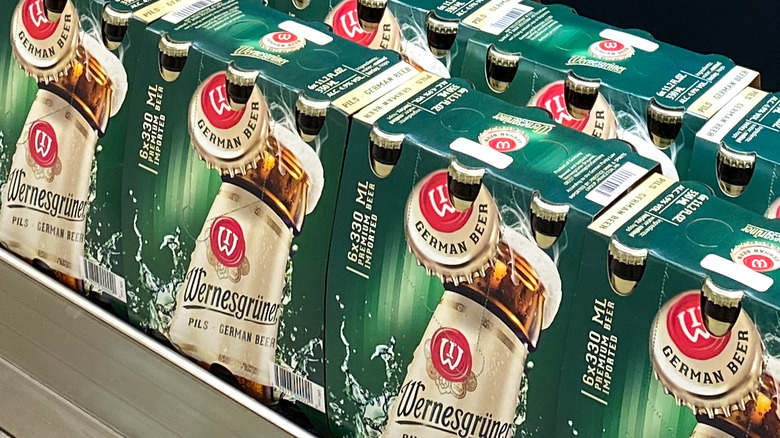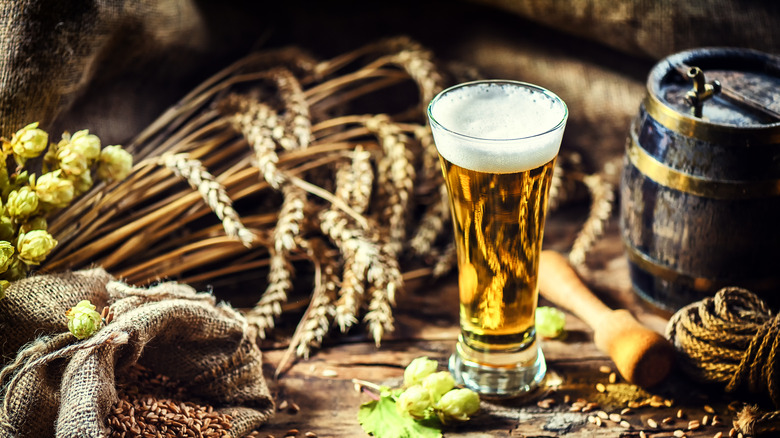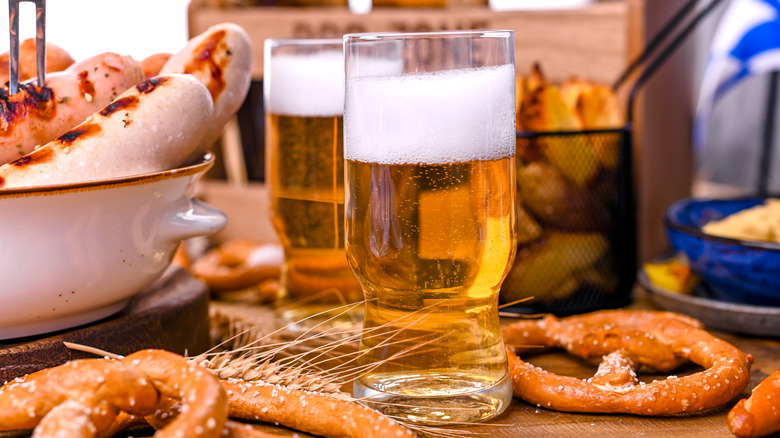Aldi's Wernesgrüner Pilsner Is A Truly Authentic German Beer
If you didn't know, Aldi's is German; if you know Germans, you know they're serious about their beer. So it makes sense that the pilsner sold at Aldi is the real deal. Not only is it made and imported from Germany, but it's also made at a brewery that has been brewing beer since 1436. The Beverage Tasting Institute gave the Wernesgrüner Pilsner a 92-point gold rating and listed it as exceptional. Aldi describes the beer as having a "brilliant golden color with discrete hops taste and a note of bitterness."
The BTI tasting notes claim the beer has a "Straw color. Aromas and flavors of fresh sourdough, peanut shell, hay, and herbs with a silky, crisp, effervescent, dry light-to-medium body and a smooth, refreshing, medium-length finish revealing suggestions of biscuits, citrus, and toasted brussels sprouts." Whether or not you get all of that out of the 16-ounce can, you'll probably agree that the pilsner is "A light and refreshing beer with nutty and malty tones on the finish."
Made to a high standard
It's even made in accordance with the German Beer Purity Law of 1516. Called the Reinheitsgebot, it's the oldest food safety law still followed today. With exceptions for regionally historic styles like the Berliner Weisse and witbier from Thuringia — which includes orange peel and coriander seed — the Reinheitsgebot stated that the only ingredients allowed in beer are malt, hops, yeast, and water, though wheat and yeast were allowed over time. In the Middle Ages, brewers would add all kinds of things to beer, including unsafe ingredients. Today, it means no added stabilizers, enzymes, emulsifiers, preservatives, artificial flavors, or colorants, and beers that don't meet the criteria cannot be legally sold in Germany as bier.
Although there is some argument in the brewing industry over the restrictive nature of the law, it's well-regarded. According to Marc-Oliver Huhnholz of the Brauer-Bund, the German Brewery Association, of the 89% of Germans who are aware of the law, 79% deem it "worthy of protection" and "precious."
Experimental brewers like Sam Calagione of Dogfish Head and John Maier of Rogue Ales have no love for the law, calling it "art censorship" and "like brewing with handcuffs," respectively. Huhnholz, however, notes that "Around 98% of so-called craft beers are brewed according to the purity law anyway." And when it comes to traditional beers like the Wernesgrüner Pilsner, people expect a certain traditional profile.
A German Favorite
Although pilsner is traced back to the Czech city of Plzeň, it is a favorite of German beer drinkers. The history is a little hazy, but it's fairly well accepted that the first pilsner beer was developed by Bavarian brewer Josef Groll in 1842. The original recipe was made with soft water, malt barley, and saaz hops, which gives the beer its spicy characteristics. It's a type of lager, which means it is kept at cooler temperatures during fermentation. This process, called lagering, differs from the process of fermenting ales in that it causes the yeast to ferment at the bottom.
These days, there are four styles of pilsners: American, Belgian, Czech, and German. German-style pilsners, with heightened bitterness, tend to strike a balance between light lagers and hoppy ales. German pilsners can be made with any combination of German noble hops and typically sits at the fairly light ABV of 4.5 – 5.5%. The Wernesgrüner Pilsner has an ABV of 4.9% and is made with multiple German noble hop varieties grown in the Hallertau and Elbe-Saale regions.


